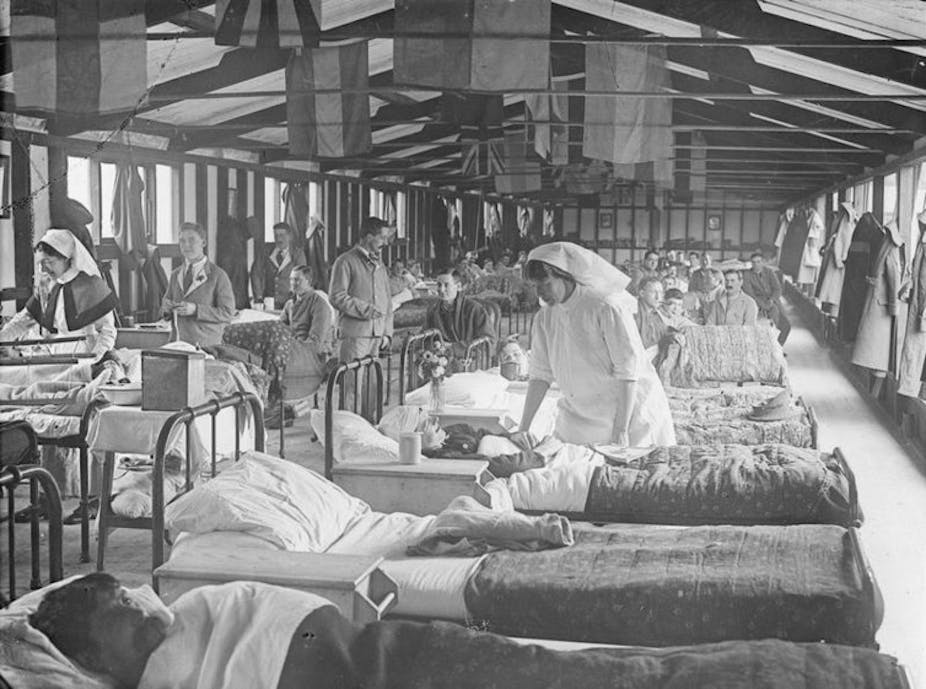A century ago the world went to war. When the conflagration finally ended 10m soldiers lay dead. Among the fallen were 18 medical doctors who had trained at St George’s Hospital and countless more from across the country.
The full horror of this crept up on me two weeks ago at our graduation ceremony. As I was applauding from the stage it occurred to me that if these students had graduated a century earlier many would have found themselves knee deep in the bloody mud of Flanders fields before the year was out. It also occurred to me that a fair few would never have returned. Such thoughts sent cold shivers running down my spine on what was otherwise a sweltering day. They also impelled me to think harder about the role of military doctors and whether military medical ethics differ from civilian medical ethics.
In a rather fundamental sense there is something antithetical about war and medicine. Medicine is about saving lives and healing the sick, war is about death and destruction. Indeed, the very idea of a military medic seems almost oxymoronic. Is it not inevitable then that if doctors go to war medical ethics will feel the strain?
Michael Gross, a prominent commentator certainly thinks so. He argues that military doctors cannot remain above the fray; sometimes they must act in ways that contravene civilian medical ethics. He even suggests that it may be permissible for doctors to provide medical care that facilitates interrogational torture.
But not everyone agrees. The World Medical Association declares that “medical ethics in times of armed conflict is identical to medical ethics in times of peace”, and many other ethicists argue that military physicians should not be regarded as doctors first and soldiers second, but as as physicians “first, last, always”.
What’s the difference?
Why might military medical ethics be different to civilian medical ethics? The obvious answer is that military doctors face scenarios that are more urgent and extreme than those faced by their civilian brethren. The demands of wartime triage and requests for battlefield euthanasia seem to fit the bill. However, many civilian doctors have to deal with requests for euthanasia too, and many more have to make difficult decisions about where to allocate resources.
It is also important to remember that many of the ethical dilemmas faced by military doctors - for example whether to breach the confidentiality of a wounded enemy combatant or to give an experimental vaccine to a solider without consent - are not always urgent or extreme.
Why else might civilian and military medical ethics differ? Perhaps the answer has something to do with the concept of military necessity. International humanitarian law makes clear that war cannot be prosecuted without regard to a number of international conventions; total war is unlawful. However, there is an acceptance that warfare is not bloodless and that it is sometimes permissible for soldiers to cause harm for a just cause.
How does this apply to military physicians? Perhaps it doesn’t, but some would argue that military doctors should sometimes contravene the normal rules of medical practise in order to ensure that a battle (or a war) is won. For example, many would defend the decision in World War II to give penicillin to soldiers suffering from gonorrhoea rather than to seriously wounded soldiers because the former could quickly return to active duty while the latter couldn’t.
Even here, though, there is considerable overlap in ethics. Civilian doctors are taught that the care of their patient should be their greatest concern and the primacy of the rights and autonomy of individual patients is very prominent in civilian medicine. But wider considerations relating to the public good do sometimes mean that civilian doctors have to act against the wishes and the best interests of their patients. For example, patients who have a notifiable disease can be detained against their will if their condition is communicable and if they represent a serious threat to others.
If we accept that the successful prosecution of a just war is a public good, can we not argue that a military doctor who acts against the best interests of her patients in order to ensure that a battle is won is effectively acting in accordance with the “normal” rules that govern civilian medicine?
Perhaps this is not right. But even if we adopt this perspective we should not conclude that there aren’t any limits to what healthcare professionals can do in the name of military necessity. For example, directly torturing a terrorist suspect or turning a blind eye to the abuse of detainees should forever remain beyond the pale.

